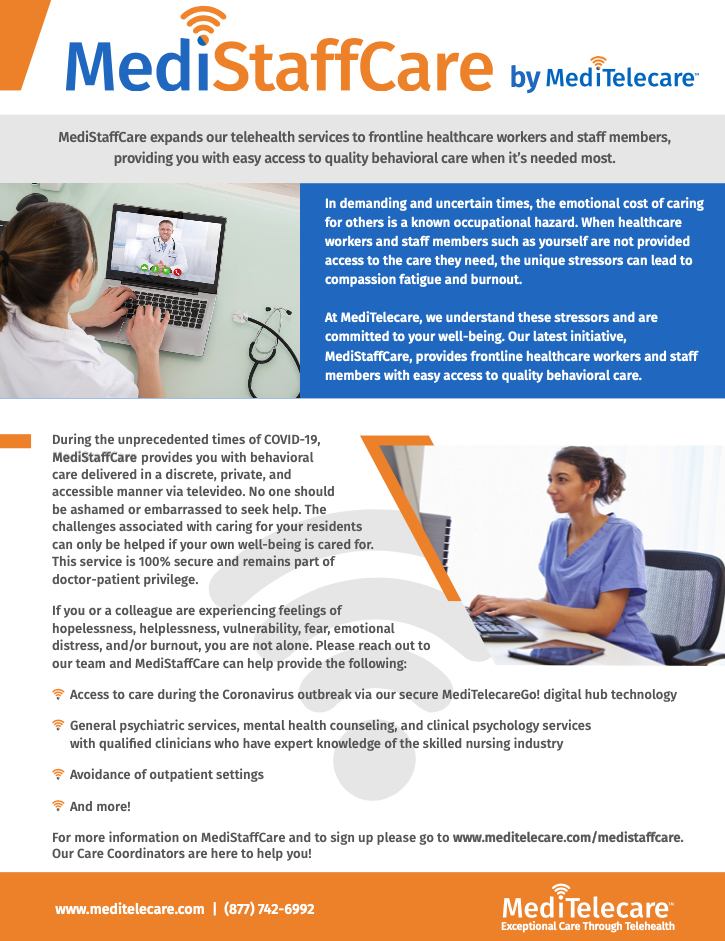
Seeking behavioral health support for your residents and your staff should be accessible at your fingertips! MediTelecare™ has expanded our services and technology to give you the best available support by helping you identify residents at risk, easy access to behavioral health care, and additional resources for your staff.
Coping Strategies
Residents and staff alike can use these behavioral health “first aid” coping strategies to feel supported during this crisis:
Express your feelings and thoughts
Develop a list of goals for the future
Start keeping a journal
Write a thank you note to someone who has helped you
List what you are grateful for
Share and connect with others
Knit baby blankets or hats to donate to a hospital
Share a favorite recipe
Send a letter or email to a loved one, old friend, or acquaintance
Use creative outlets
Color, draw, or doodle
Play music, dance, or sing
Listen to a podcast or radio show
Read a book or magazine
Look through a photo album
Stay active
Stretch, or when possible, take a walk
Practice mindful breathing
Escape reality with your imagination
Reminisce of the past and share stories with others
Close your eyes, visualize a favorite place and revel in the moment
How MediTelecare™ Can Help:
IDENTIFICATION

With digital referrals and assessment tools, MediTelecare™ proactively identifies at-risk residents.
The MediReview™ helps your facilities to identify silent sufferers and optimizes preventative behavioral health care. It also helps identify residents that may require additional screening tools to diagnose conditions including PTSD, depression, and neurocognitive disorders.
ACCESS

Our MediTelecareGo!™ mobile app provides remote access to behavioral health services when your residents need them most through:
Laptop Workstations
iPads
Telephone Visits
Our new Virtual Waiting Room offers access to urgent care when help can’t wait.
Support For Facility Staff

Compassion Fatigue
Compassion Fatigue is the emotional and physical reaction to caring for others without being able to refuel and tend to one’s own needs. Facility staff may be suffering now more than before, as they spend countless hours caring for patients as they battle this infection.
Common Signs
Exhaustion
Frequent absenteeism & disconnectedness from loved ones
Change in personality, anger, or irritability
Decreased ability to empathize and care
Feeling burdened by patients
Trouble separating work from personal life
Loss of hope
Remedies
Create an open space for staff to discuss thoughts, feelings, & concerns
Foster a sense of community
Offer opportunities for supervision & peer support
Encourage taking breaks
Provide access to trainings
Validate all mental health concerns
Be transparent with facility information and updates
Mental Health First Aid
Mental health “first aid” refers to the strategies that frontline healthcare workers can deploy to provide emotional care to their patients during a crisis. These interventions can be incorporated into caregiving to alleviate distress and establish an improved emotional connection with residents.
Below are tips on how to integrate compassion into patient interactions:
Acknowledge the individual’s anxiety and validate that this is a frightening, overwhelming time → “These are difficult times for all of us.”
Use your own feelings of fear and uncertainty to understand your resident’s perception better → “I worry, too, but we are all in this together.”
Use phrases that convey understanding and offer support → “I understand how afraid you are, and I will do my best to keep you safe.”
Model health behaviors and attitudes → “I find that when I am feeling overwhelmed, calling a close friend helps take my mind off of things.”
Self Care
Self Care are the activities and practices individuals take to maintain and improve their mental health and overall wellbeing. Practicing self care can help frontline workers prevent experiencing burn-out and compassion fatigue.
Self Care Tips & Tricks
Take time for yourself every day. Unplug from work & responsibilities to decompress
Use exercise as a physical outlet
Express your emotions and feelings in a journal daily
Practice self-compassion. Let go of guilt
Take small breaks during work to hydrate, nourish, & replenish
Engage in meaningful activities and hobbies
Establish a “buddy system” at work for support & mental health check-ins
Practice meditation, deep breathing, & other forms of relaxation
Eat healthy meals - limit sugar & alcohol intake
Adhere to a schedule & prioritize sleep
Seek support if you notice major changes in mood or anxiety levels
MediStaffCare
MediStaffCare
expands our telehealth services to frontline healthcare workers as they cope with increased emotional distress from the adverse effects of the pandemic.Facility staff can contact (877) 742-6922 to participate in MediTelecare’s educational webinars for resources on topics including Trauma Informed Care, Mental Health in a Time of Crisis, and other relevant topics for senior care providers.
Email customercare@meditelecare.com or call (877) 742-6992 to provide your staff and residents support during these challenging times.




